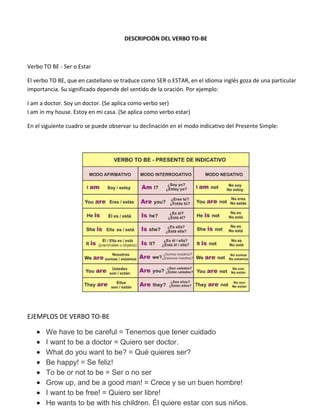
Descripción del verbo to be
- 1. DESCRIPCIÓN DEL VERBO TO-BE Verbo TO BE - Ser o Estar El verbo TO BE, que en castellano se traduce como SER o ESTAR, en el idioma inglés goza de una particular importancia. Su significado depende del sentido de la oración. Por ejemplo: I am a doctor. Soy un doctor. (Se aplica como verbo ser) I am in my house. Estoy en mi casa. (Se aplica como verbo estar) En el siguiente cuadro se puede observar su declinación en el modo indicativo del Presente Simple: EJEMPLOS DE VERBO TO-BE We have to be careful = Tenemos que tener cuidado I want to be a doctor = Quiero ser doctor. What do you want to be? = Qué quieres ser? Be happy! = Se feliz! To be or not to be = Ser o no ser Grow up, and be a good man! = Crece y se un buen hombre! I want to be free! = Quiero ser libre! He wants to be with his children. Él quiere estar con sus niños.
- 2. Im going out, but I won`t be long. = Me voy afuera, pero no estaré por mucho tiempo. I must be off. = Tengo que ir. Tanto en el modo afirmativo como en la forma negativa pueden utilizarse las siguientes contracciones: EJEMPLOS My sister is a good swimmer (She) Elizabeth Taylor is an Oscar awarded actress (She) My husband is happy at home (he) Mr. Barack Obama is the president of the United States of America (He) The television is still on (It) Benny the dog is a key character in the movie Vanilla Sky (It) My brother and I are very good friends (We)
- 3. People in Siria are suffering from violence (They) Cats and dogs are natural enemies (They) Ahora veremos la conjugación del verbo TO BE en el Pasado Simple, tiempo verbal que corresponde al equivalente en castellano del Pretérito Imperfecto y Pretérito Indefinido: Aquí también se pueden utilizar las formas contraídas únicamente en la forma negativa:
- 5. UNIT 2 PART I. THERE TO BE (HABER, EXISTIR) A. PRESENT TENSE: THERE IS - THERE ARE Estas expresiones se usan para indicar la existencia de algo. Son equivalentes a la expresión HAY, en castellano. THERE IS /δear íz/ se usa con sustantivos singulares o incontables. THERE ARE /δear á:r/ se usa con sustantivos plurales. Normalmente, en el singular, se usa la contracción THERE´S /δéarz/. There is a book on the desk /δear íz e búk on δe désk/ (Hay un libro sobre el escritorio) There´s a car in the car park. /δéarz e ká: r in δe ká: r pa: rk/ (Hay un auto en el estacionamiento) There´s some water in the glass. /δéarz sam wóter in δe glæs/ (Hay agua en el vaso) There are 10 students in my class. /δear á:r tén stiúdents in mai klæs/ (Hay 10 alumnos en mi curso) There are some chairs in the room /δear á:r sam tchéarz in δe rúm/ (Hay algunas sillas en la sala) EJEMPLOS There is a lighthouse on the beach. Hay un faro en la playa. There is a store round the corner. Hay una tienda a la vuelta de la esquina. There are two houses near the station. Hay dos casas cerca de la estación. There are three schools in this town. Hay tres escuelas en esta ciudad. There was a party last night. Hubo una fiesta anoche. There was a kitten in the basket. Había un gatito en la canasta. There were many people at the concert. Había mucha gente en el recital. There were many accidents last night.
